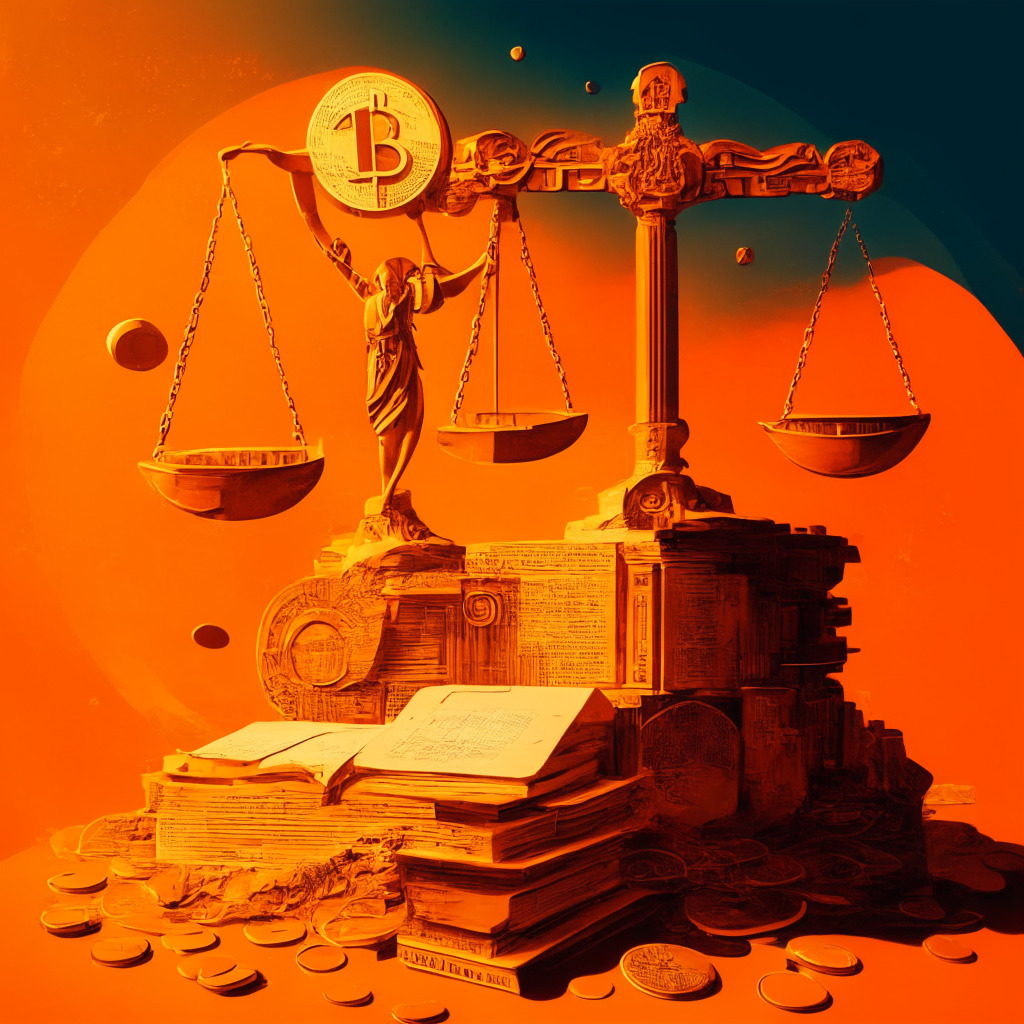JP Morgan’s recent report suggests that the approval of a spot Bitcoin ETF by the SEC may not significantly affect the crypto asset’s price or adoption, based on lukewarm interest from institutional investors and modest performance of other Bitcoin products.
Search Results for: JP Morgan
Crypto Relief as JP Morgan CEO’s Political Aspirations Fade: What’s Next for Regulation?
JP Morgan CEO Jamie Dimon, known for his anti-crypto stance, will not run for office, providing relief to digital asset industry participants. As the 2024 US presidential election approaches, consensus among lawmakers for clear cryptocurrency regulation is becoming more essential, with the growing interest in blockchain technology emphasizing the need for regulatory harmony.
Bankzilla Rising: JP Morgan Swallows First Republic Bank, Bitcoin Braves The Storm
The second biggest bank failure in US history has just taken place, and First Republic […]
Ethereum Staking Surge Sparks Centralization Concerns: A Deeper Dive into JPMorgan’s Analysis
The article reveals Ethereum’s staking growth is leading to increased centralization, with five entities controlling most staking activities. This generates risks like potential single points of failure and lower staking yields. Analysts suggest this centralization might challenge blockchain networks’ decentralization and trustlessness principles.
Bahrain’s Bank ABC and JPMorgan Pioneering Blockchain Cross-Border Payments: An In-Depth Look
“Bahrain’s Bank ABC has partnered with JPMorgan to use its Onyx blockchain for cross-border payments, marking the first Middle Eastern partnership with JPMorgan’s blockchain service. The blockchain-based payments promise to reduce settlement times and costs, initially piloting transactions in the US, UK, Singapore, and Hong Kong, using the US dollar.”
JPMorgan’s Move into Blockchain-Based Cross-Border Transactions: A Game-Changer or Threat?
JPMorgan is reportedly developing a blockchain-based system for cross-border transactions, alongside a new deposit token aimed at speeding up settlements for corporate clients. These efforts, pending regulatory approval, could encourage other banks to consider blockchain solutions and deposit tokens, amidst challenges from other digital tokens and stablecoin issuers. The future of crypto isn’t just about innovation, but also about maintaining a balance between progress and security.
JPMorgan Accelerates Blockchain Integration: Pros, Cons, and Future Implications
JPMorgan Chase & Co accelerates blockchain integration in conventional banking, evidenced by euro-based payments for corporate clients using its JPM Coin. This aims to streamline cross-border payments and enhance efficiency for customers as traditional finance firms show significant interest in the crypto and blockchain industries.
JPMorgan Partners with Indian Banks: Blockchain’s Game-Changing Impact on Dollar Transfers
JPMorgan partners with six major Indian banks to introduce a blockchain-based platform for 24/7 dollar transfers, aiming to provide instant transactions and enhance interbank settlement systems. The pilot project, launching on June 5th, uses JPMorgan’s Onyx platform and could potentially revolutionize the financial landscape.
JPMorgan’s Blockchain Partnership With Indian Banks: Pros, Cons & GIFT City’s Future
JPMorgan Chase partners with six major Indian banks to launch a blockchain-based platform for settling interbank dollar transactions, aiming to enhance efficiency and expedite transactions. The pilot project utilizing JPMorgan’s Onyx platform is scheduled to start on Monday.
JPMorgan & Indian Banks Revolutionize Interbank Dollar Transactions with Blockchain
JPMorgan collaborates with six Indian banks to enable real-time, round-the-clock interbank dollar transactions on its blockchain-based platform, Onyx. This aims to significantly increase transaction efficiency, enhance security and transparency, and potentially transform the financial industry.
JPMorgan’s IndexGPT Entry & AI Future: Balancing Innovation with Privacy Concerns
JPMorgan Chase files trademark application for IndexGPT, an AI tool for various business units, highlighting the importance of AI for future success. Amid exciting AI applications, concerns over data privacy and security must be carefully considered, balancing innovation and privacy.
AI Arms Race: JPMorgan Chase’s Finance Chatbot and the Ethical Debate on Unregulated AI
JPMorgan Chase filed a trademark application for finance-focused chatbot IndexGPT, aiming to use it for advertising, marketing, tracking securities values, and providing financial information. With AI playing a significant role in future trading, the company has allocated over 2,000 experts to enhance its AI capabilities. Incorporating AI-driven solutions while mitigating risks and ethical concerns will be crucial in shaping the future of finance and technology.
Failed First Republic Bank Acquired by JPMorgan Chase: Pros, Cons, and the Impact on Blockchain Future
The acquisition of the failed First Republic Bank by JPMorgan Chase has attracted considerable attention […]
JPMorgan Swallows First Republic Bank: A Banking Behemoth’s Feast or an Unexpected Lifeline?
JPMorgan Chase, the American banking colossus, has recently acquired all the assets of First Republic […]
Unmasking the Grim Scandal: JPEX Crypto Fraud and the Controversial Stand of Chase UK
Hong Kong’s security chief, Chris Tang Ping-keung, pledges swift action in the JPEX crypto exchange fraud case involving over 2300 victims with losses exceeding $175 million. This incident brings into focus the need for stringent regulations and transparent operation in the largely volatile digital currency market.
JPM Coin’s Blockchain Milestone: Changing Finance Landscape and Challenging Skeptics
JP Morgan marked a milestone by conducting its first blockchain-based transaction using JPM Coin for corporate clients in Europe, with Siemens AG leveraging the system for a euro-denominated payment. This highlights the growing adoption of blockchain technology for secure and efficient financial operations, as traditional institutions increasingly explore its potential for their businesses.
JPM Coin Expands to Euro Transactions: Impact on Corporate Clients and Future Prospects
JPMorgan has expanded its JPM Coin blockchain payment service to include euro-denominated transactions for corporate clients, enabling 24/7 transfers between accounts globally. This provides an alternative to traditional methods and can lead to more effective liquidity management, particularly for major banks exploring blockchain technology for improved processes.
JPM Coin Expands to Euro Payments: Can Blockchain Rival Traditional Transaction Methods?
JPMorgan expands its settlement token JPM Coin for euro-denominated payments, with German tech giant Siemens executing the first euro payment. JPM Coin has processed over $300 billion in transactions since its 2019 induction, signifying significant blockchain integration within a traditional financial institution, though it still faces challenges such as scalability and industry skepticism.
JPM Coin Euro Payments: Blockchain Revolutionizing Traditional Banking Services
JPMorgan expands its blockchain-based payment system, JPM Coin, introducing euro-denominated payments for corporate clients. This move brings blockchain technology into traditional banking services, offering instant transactions, 24/7 transfers, reduced costs, and increased interest income on deposits, while challenging conventional banking methods.
Crypto Clash: Wall Street Giants Embracing Blockchain – Boon or Threat to Decentralization?
Large entities like Blackrock and JP Morgan have evolved from initially rejecting to actively embracing cryptocurrencies, stirring mixed reactions. The recent Blackrock Bitcoin ETF application sparks debate over sustainability of decentralization ethos and big business involvement in the crypto market, with SEC’s decision being closely monitored.
2024 Presidential Election: Crypto Regulation Takes Center Stage in Debates
The 2024 US presidential election could witness discussions on crypto market regulation taking center stage, impacting the US’s position as a global crypto hub. Prospective candidates like Ron DeSantis and Robert F. Kennedy Jr. openly support digital asset trading freedom, while JP Morgan CEO Jamie Dimon’s potential candidacy raises questions about cryptocurrency’s role in the American financial landscape.
AI Chatbots: Revolutionizing Finance or Replacing Advisors? Weighing the Benefits and Risks
JP Morgan Chase files a trademark application for an AI chatbot, IndexGPT, revolutionizing the finance industry by providing investment advice. However, concerns arise about the displacement of traditional advisors and the potential drawbacks of AI, such as privacy and public safety issues.
Brazil’s Blockchain Revolution: Tokenizing National Identity with Cause and Concern
Brazil is planning to tokenize the identities of over 214 million citizens through digital documents, using blockchain technology. This initiative, aiming for complete coverage by November 6, promises enhanced security against fraud and improved inter-government collaboration and service accessibility.
Chase UK’s Crypto Transaction Restrictions: Safety Measure or Infringement of Financial Freedom?
“Chase UK imposes restrictions on all cryptocurrency-related transactions for UK residents, hindering customers from conducting crypto activities via debit cards or bank transfers. While aimed at preventing cryptocurrency fraud and scams, critics view this as a barrier to financial freedom and growth in cryptocurrency investment.”
The Impending Revolution of Asset Tokenization: Promises and Challenges
“Tokenization of assets, estimated to reach a value of $16 trillion by 2030, offers immense potential in democratizing finance. It allows for fractionalized investments, expanding opportunities to the general population. However, integration of blockchain without disrupting existing services poses a significant challenge.”
Google Cloud Partners with Web3 Startup: A New Era for Mainstream DeFi or A Risky Gamble?
“Google Cloud is partnering with Web3 startup, Orderly Network, to develop user-centric developer tools with an aim to mainstream decentralized finance (DeFi). The goal is to lower barriers preventing widespread adoption of decentralized technology amid growing interest in blockchain workloads.”
Regulatory Scrutiny vs Technological Advancements: Navigating the Complex Crypto Landscape
Despite regulatory challenges and hacking threats, the crypto sphere continues to innovate, with enhanced privacy, user experience, and transaction efficiency. As Ethereum plans a major transformation and Ripple maintains its legal standing, the tokenized assets market could reach $16 billion by 2030. However, effective regulation remains vital to safeguard all stakeholders.
Bitcoin’s Rough September: The Impact of Regulatory Delays and Inflation Worries
Bitcoin’s value declines amidst regulatory delays and macroeconomic concerns linked to a rising US budget deficit. Despite regulatory setbacks, positive outlook on a potential Bitcoin ETF remains. Australian “Digital Assets (Market Regulation) Bill 2023” undergoes examination, aiming to balance innovation and consumer safety in the digital asset ecosystem.
Emergence of Tech Adaptability: Digital Asset Miners Venturing into AI Services
“Digital asset miners are venturing into artificial intelligence, aiming to boost earnings and decrease dependency on conventional cryptocurrency operations. Notably, Bitcoin and Ethereum miners are driving this switch, while some miners continue mining other Proof-of-Work assets. Mining companies are rebranding to echo this trend, finding high-performance computing services for AI firms potentially more profitable than Bitcoin mining.”
Democratizing Finance: The Potential Role of Blockchain and Tokenization
“Blockchain technology’s potential lies in tokenization’s ability to democratize finance by offering broader investment options via fractionalized investments. By applying an ETF-like structure to alternative investments such as real estate and private equity, blockchain can offer liquidity, transparency, and efficiency, enhancing investor portfolios. Major institutions are already exploring tokenization, potentially creating a trillion-dollar digital securities market.”
Navigating the Crypto Market: How Current BTC Ownership Trends Influence Global Finance
“Bitcoin speculators currently own the least BTC since its historic high of $69K, indicating market exhaustion. A decrease in BTC price could push short-term holders into a negative balance. Despite risks, long-term investor commitment in Bitcoin remains high, and El Salvador’s adoption of Bitcoin has boosted investor confidence.”
El Salvador’s Financial Revolution: Embracing Bitcoin and Soaring Bond Yield Success Story
“Despite early uncertainty, El Salvador’s adoption of Bitcoin as legal tender has led to an astounding 70% return in its dollar bond yields in 2023. The success, including the on-time payment of an $800 million debt, has significantly boosted investor confidence and highlights the potential impacts, positive and negative, that blockchain technologies could have on conventional financial systems.”































